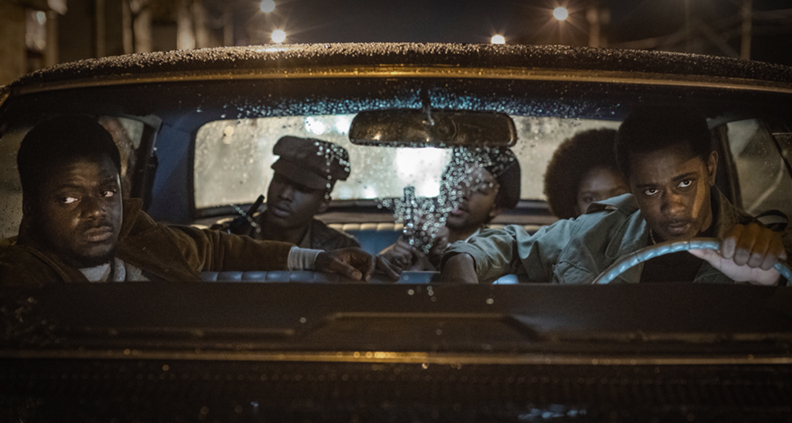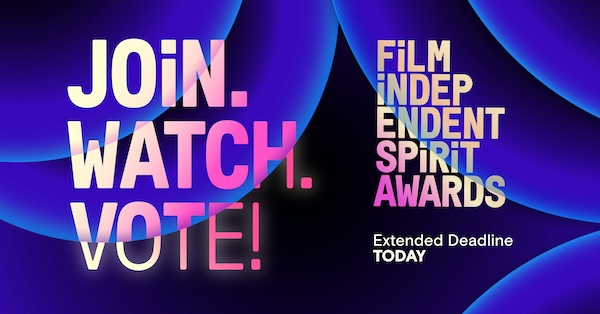Someone We Watched: Shaka King, from Cannabis Capers to ‘Judas and the Black Messiah’
Each year, the Film Independent Spirit Awards give the Someone to Watch Award to an emerging filmmaker of singular vision. In this column, film critic David Bax revisits some of the grant’s recipients to see how their work and careers have continued to develop.
The 2021 Someone to Watch Award, along with the Truer Than Fiction and Producers, will be awarded *tomorrow*–Tuesday, March 16–in a special online Grant Winners reveal presentation right here on filmindependent.org.
***
As a title, Newlyweeds–for which director Shaka King won the 20th annual Someone to Watch Award at the 2014 Film Independent Spirit Awards Grant Awards Presentation–is misleading on multiple counts. First, it conjures up images of some direct-to-market stoner comedy with a punny punchline like, “They vow to love, honor and o-blaze!”
But this is no high-concept farce nor are its conflicts melodramatic; rather, King and his cast adhere to natural, conversational rhythms. And weed itself is just a red herring, more a symptom than a cause of the central couple’s stagnation.
Second, the title implies a co-lead situation when, in reality, the male half of the pair (who aren’t newly or in any other way married) is the focus. Sure, King seems to like Nina (Trae Harris) a bit more. And who wouldn’t? She’s happier and more fun than her boyfriend, with a fulfilling job and aspirations to travel. But Lyle (Amari Cheatom) is more dramatically interesting, stuck in a truly awful line of work and prone to fits of insecurity, jealousy and unreliability.
As will become clear in King’s follow-up feature, Lyle is exactly the sort of guy—likely to be dismissed as a loser by others—for whom the director has a deep well of sympathy.
After Newlyweeds, King applied his chops to television comedies, directing a handful of episodes of the TBS single-cam People of Earth and Hulu’s Shrill, as well as two particularly great installments of HBO’s High Maintenance. The latter credits may have cemented King’s connection with the whole weed thing but, more importantly, they made terrific use of his sensitivity to the ways that city life forces people alongside and on top of one another, breaking down the barriers between the personal and the interpersonal.
Those skills came very much in handy in King’s return to feature film–the stunning and invigorating Judas and the Black Messiah, released earlier this year—where his confident honesty seamlessly turns present day Cleveland into 1960s Chicago. A recounting of the relationship between Illinois Black Panther Party chairman Fred Hampton (Daniel Kaluuya) and Bill O’Neal (Lakeith Stanfield), the FBI informant whose double dealing led directly to Hampton’s murder, Judas wouldn’t seem like the obvious next step for a director known for funny, intimate stoner stories. But the rambunctious opening sequence in which O’Neal steals a car by pretending to be a federal agent exhibits King’s facility at blending comic high jinks and real tension.
There are a few obvious similarities between Newlyweeds and Judas, the most immediate being that Cheatom returns in the latter playing one of the leaders of a fictional Chicago gang called the Crowns, a stand-in for the handful of such organizations the real Hampton rallied to his cause. Both films also feature private moments in parked cars. In the middle of a teeming city, automobiles can act as a sort of Cone of Silence, a quickly accessible spot in a public space convenient for conversations, confrontations or drug deals.
One of the less superficial similarities between the two movies is actually highlighted by a difference. Given O’Neal’s cooperation with the FBI and the Panthers’ general platform of opposition to the police, Judas is crawling with representatives of law enforcement. In Newlyweeds, both Lyle and Nina get locked up on separate occasions but their face to face interactions with police officers are very limited and even generally pleasant (one brings Lyle a cup of water in the holding cell, the other allows Nina a second phone call when her first goes unanswered.) But both films illustrate the constant, threatening presence of cops in the lives of Black Americans. They’re there even when they’re not and, as O’Neal tells Agent Mitchell (Jesse Plemons): “A badge is scarier than a gun.”

But these are merely motifs and themes. At the core of both films and, at the core of King’s humanistic impulses, lies a deep affinity for tragic schemers and fuck-ups (the types of characters, actually, who wouldn’t be out of place in a film by Adam Leon, about whom I wrote in the very first edition of the Someone We Watched column.) Lyle and Bill can both be supremely exhausting and frustrating. Whether it’s Lyle skipping out on a planned date night with Nina to try out a coworker’s friend’s new vaporizer or Bill knowingly taking actions that will lead to the murder of a man he respects and the destruction of an ideal in which he believes, there’s repeated exasperation at the fact that these men are aware of what the right thing to do is and are given the opportunity to do it but consciously choose the opposite path.
If that seems like an apples and oranges comparison, it’s worth pointing out that Lyle has compromised his own morals, as well. His soul-draining, self-hatred-inspiring job is to drive around with an opinionated loudmouth (Tone Tank, who also appears in Judas as another garrulous asshole, this time in a blue uniform) and repossess electronics and home furnishings. Just like Bill in his larcenous introductory scene, Lyle even puts on a costume from time to time in order to take things away from other poor people.
What makes King such a rewarding and mature storyteller is that, despite the obvious moral shortcomings and lack of responsibility of these men, he still loves them. There’s an unconditional empathy required of filmmakers who endeavor to explore human psychology and social interconnectivity rather than just illustrate talking points. Only two films into what will hopefully be a long and fruitful career, King has already demonstrated that he has it and then some.
Other nominees: Like King, Madeleine Olnek has also made just one feature in the intervening years, following up her lesbian grifter comedy The Foxy Merkins with 2018’s lesbian historical comedy Wild Nights with Emily. Aaron Douglas Johnston, on the other hand, has yet to release a follow-up to My Sister’s Quinceanera, an intimate, tragicomic gem that played the LA Film Festival in 2013. IMDb has him in post-production on something called Closer to Home, another teenage dramedy.
The 36th Film Independent Spirit Awards, hosted by Melissa Villaseñor, will be broadcast exclusive on IFC Thursday, April 22 at 10:00 pm ET. Check out all of this year’s nominees here.
To learn more about supporting Film Independent’s mission and programs, contact Jennifer Murby at jmurby@filmindependent.org.
For sponsorship opportunities, please contact Stephanie Terifay at sterifay@filmindependent.org.
The Film Independent Spirit Awards are presented by Premier Sponsors Genesis and IFC. FIJI Water is the Official Water. Getty Images is the Official Photographer. We are also honored to be partnering with the Association of National Advertisers’ (ANA) SeeHer, the leading global movement for gender equality in media, advertising, marketing and entertainment and AMC Networks to further celebrate and act as a catalyst for accurate and meaningful representation in storytelling. Tune in April 22!

